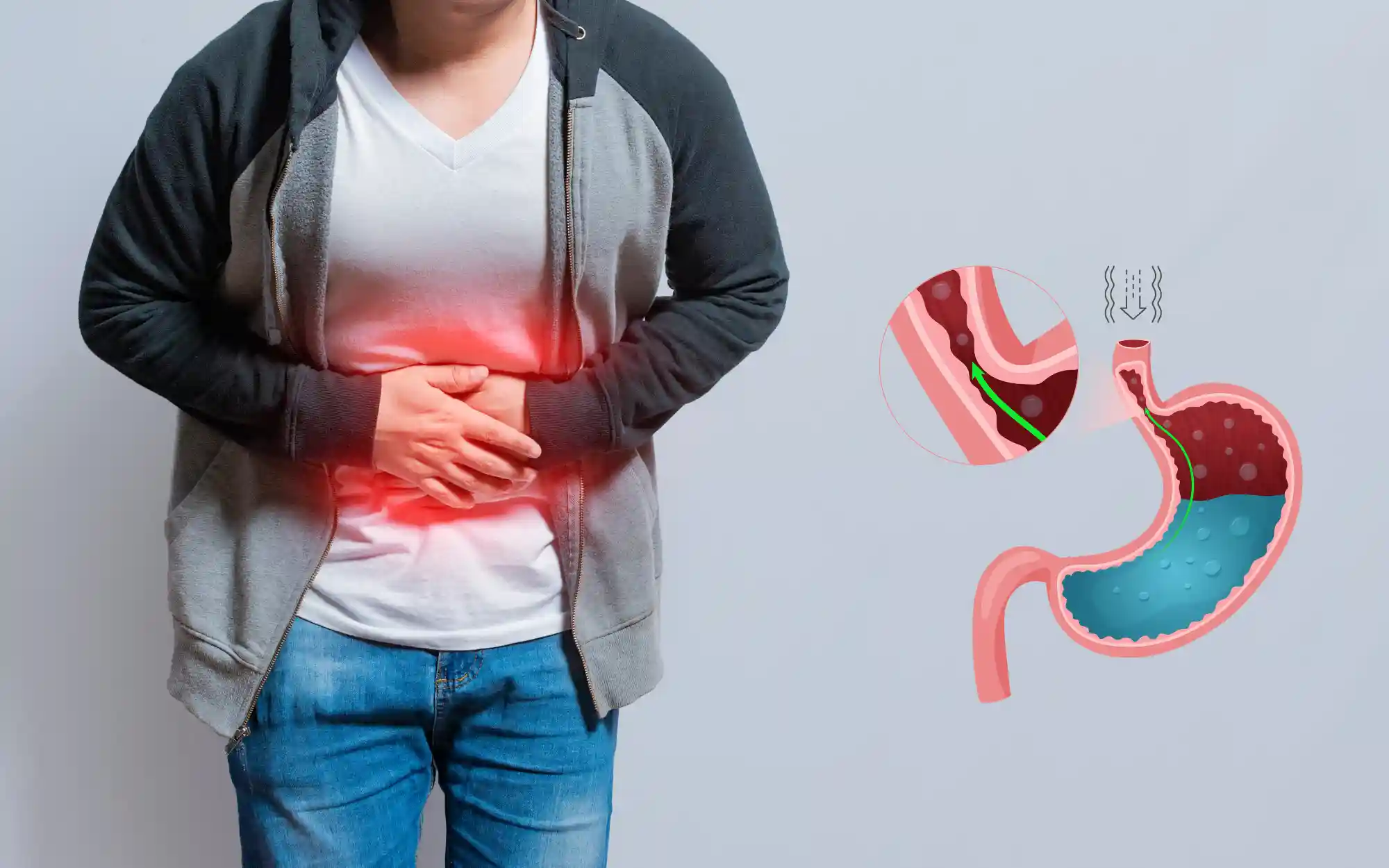Gas trouble, additionally called flatulence or bloating, is a common gastrointestinal problem. It occurs when excess gas accumulates in the digestive system, leading to discomfort, belching, and passing gas.
While occasional gas is normal, an excess may be bothersome and embarrassing. In this article, we will learn about its symptoms, causes, and effective solutions.
What Causes Intestinal Gas?
Causes of intestinal gas include:
1. Food Intake and Digestion:
The most common cause of gas is the food we eat, particularly fiber-rich, like beans, peas, and fruits. Our bodies sometimes have difficulty fully breaking down these foods during digestion, resulting in gas.
2. Swallowed Air:
Every time we eat or drink, we swallow small amounts of air. This swallowed air accumulates in the digestive system and can lead to gas. Smoking, chewing gum, or eating too quickly can increase the air swallowed.
3. Gastrointestinal Disorders:
Conditions such as irritable bowel syndrome (IBS), gastroesophageal reflux disease (GERD), or lactose intolerance can also lead to excess gas. These disorders often disrupt normal digestion, resulting in increased gas production.
Symptoms of Gas Problem
- Excessive Burping
- Passing Gas
- Abdominal Discomfort
- Abdominal Pain
You should talk to your gastro doctor if you experience any of the above-mentioned symptoms and get the right treatment plan.
Diagnosis for Gastric Problems
To diagnose your condition, the doctor may perform which usually includes:
- Upper Endoscopy: This procedure allows your doctor to look at your esophagus, belly, and a small part of the small intestine.
- Blood Tests: These help to rule out other illnesses that could cause comparable signs and symptoms. Your doctor may also suggest a test to look for a bacterium called Helicobacter pylori that normally causes gastric problems.
- Stool Test or Fecal Occult Blood Test: It is a test to check for abnormal microorganisms inside the digestive tract that can cause gastritis and other issues.
How To Remove Gas from Stomach With Home Remedies
Although everyone produces gas, some people are more bothered by it than others. In some instances, excessive gas can become uncomfortable or even painful. But easy modifications to your food plan can relieve gas pain and aid digestion.
In addition to over-the-counter gas comfort products, items generally found in the kitchen may work as gas relievers. Luckily, many domestic treatments can assist in releasing trapped gas or prevent it from building up. These may include:
1. Peppermint Tea
Peppermint has antispasmodic properties that can help relax the muscle mass of the gastrointestinal tract, decreasing gas aches. Sip on a cup of warm peppermint tea after meals for alleviation.
2. Let It Out
Holding in gas can cause bloating, discomfort, and pain. The simplest way to avoid those symptoms is to let out the gas.
3. Chamomile Tea
Chamomile has soothing properties that can ease gastric aches and discomfort. Brew a cup of chamomile tea and drink it slowly to help relieve the symptoms.
4. Warm Compress
Applying a heat compress to the stomach region can provide relief from stomach pain. The warmth helps relax the muscle tissue and releases trapped fuel.
5 . Ginger
Ginger is known for its anti-inflammatory properties and can help reduce gas pain. For a few minutes, prepare ginger tea by steeping sparkling ginger slices in hot water.
6. Eat Slowly
Eating too quickly or while moving can cause a person to absorb air in addition to meals, leading to gas-associated pain.
Quick eaters can slow down by chewing each chunk of food 30 times. Breaking down food in morsels aids digestion and can save you from several associated ailments, which include bloating and indigestion.
7. Fennel Seeds
Chewing on a teaspoon of fennel seeds can help alleviate gas aches. Fennel seeds contain anethole, a compound that could loosen up the gastrointestinal muscles and decrease gas.
8. Activated Charcoal
Activated charcoal capsules may be taken to absorb excess fuel inside the stomach and provide relief from fuel aches. However, it’s vital to comply with the recommended dosage and consult a healthcare expert before using them.
9. Address Digestive Troubles
People with certain digestive problems are more likely to experience trapped gas. Those with irritable bowel syndrome (IBS) or an inflammatory bowel disorder frequently experience bloating and pain.
Addressing those problems through lifestyle modifications and remedies can also enhance the quality of life.
People with lactose intolerance who regularly go through gas aches have to take more steps to stay away from lactose or take lactase-based dietary supplements.
10. Avoid Trigger Foods
Certain ingredients can contribute to gas production and worsen gas pain. Common ingredients include beans, lentils, cabbage, onions, carbonated beverages, and fatty meals. Identify your trigger meals and limit their intake to reduce gas pain.
11. Exercise
Engaging in physical hobbies such as walking or gentle yoga poses can help stimulate digestion and alleviate gastric pain. Exercise promotes the movement of gas through the digestive system, imparting relief.
When Should You Call A Doctor?
Contact your healthcare provider if you notice these symptoms:
- Chest pain mimicking a heart attack could be gas related.
- Discomfort in the digestive system might be due to gas.
- Severe stomach pain with changes in bowel movements may indicate a gas problem.
- If you notice black stool or blood, it might be due to excessive gas production.
- Unexplained weight loss could be a side-effect of a gas issue.
Conclusion
Gas nuisance is a common difficulty that may cause pain and embarrassment. Using the signs, reasons, and home treatments mentioned in this article, you can naturally control and reduce gastric problems.
FAQs
1. Can certain medicines cause excessive gas?
Yes, certain medicines, along with antibiotics or laxatives, can disrupt the balance of gut bacteria and cause expanded gas.
2. Is it normal to pass gas regularly?
Yes, passing gas is a normal bodily function. On average, a person passes gas around 13 to 21 times daily.
3. Is gas a serious problem?
Extra gas can cause pain and embarrassment, but it’s normally not considered extreme health trouble. Gas in the left part of the colon can cause chest pain, which you may mistake for a heart attack.

Christopher Adams is a registered dietitian specializing in weight management and preventative healthcare. He’s also the author of a bestselling book on nutrition and a consultant dietitian for hospitals and wellness centres. Adams believes in empowering individuals to make healthier food choices using evidence-based research and practical advice.

